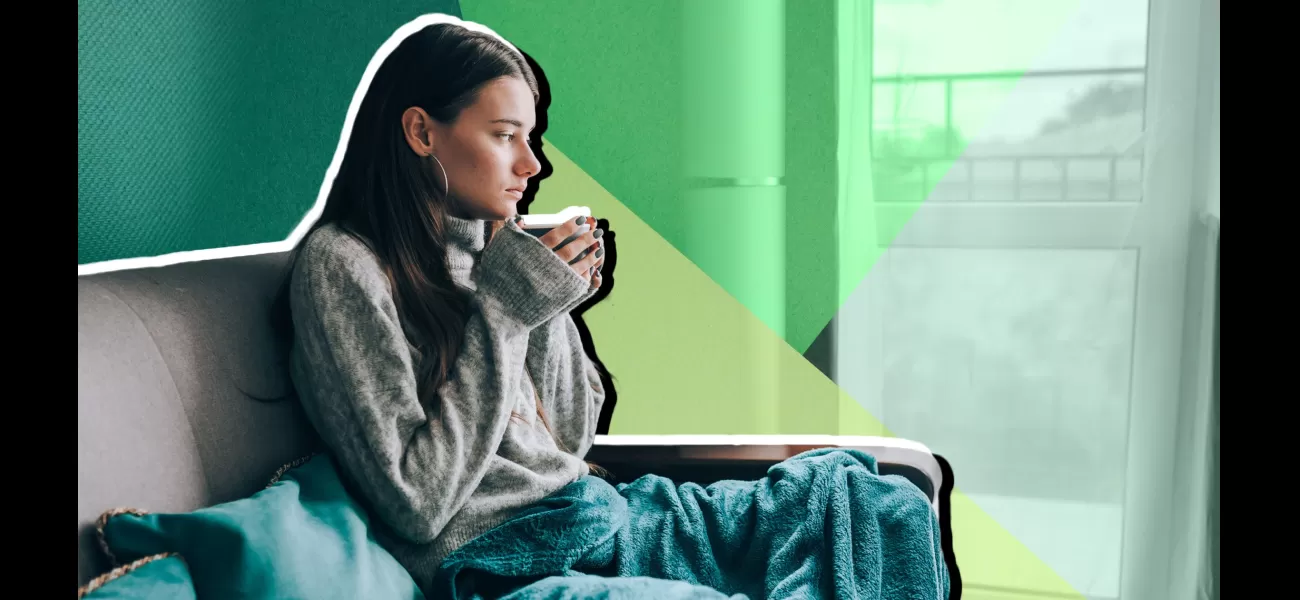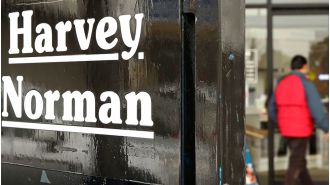Home ownership is more difficult for 50% of people, and it's not because of men.
My friends in relationships are upgrading their living situation, while I still share a house.
February 12th 2024.

Have you ever stopped to think about the earnings gap between men and women? It's a staggering 29%, which means that on average, women are taking home 29% less pay than men. This is a harsh reality that many women face, and it's affecting their ability to achieve their dreams and goals.
Take Juliette for example, a 35-year-old PR executive who lives in London. She's single and has been for a while now. She laughs as she tells me, "When I go on dating apps, I'm not looking for a husband, I'm looking for an investor." It's a sad truth that she, like many other single women, feels like she needs a partner in order to achieve the dream of owning a home in the city.
"It's not a position I ever thought I'd be in," Juliette admits. "I was in a relationship for the latter half of my 20s, and I was saving too. I thought if he matched what I had, that's a house deposit. But when we split up, it was back to the drawing board. I've got about £15,000 saved up, but I probably need to save at least another £15,000 before I can consider buying – even then, I'd only be able to afford a one-bed flat."
And it's not easy to build up a nest egg either. "London living is expensive," Juliette tells me. "Just transportation alone costs me around £200 a month, and my rent is £800. It's a struggle to make ends meet."
But it's not just the high cost of living that's making it difficult for single women like Juliette to achieve their dreams of homeownership. It's also the fact that housing is simply unaffordable for many single people, especially women.
"I could make more sacrifices," Juliette says, "but people forget that when you're single, if you don't make plans and arrange to do things with friends, you end up sitting at home alone. Yes, I could move further out, but I don't know anyone in the likes of Croydon or Essex, and when you're single, that would make for quite a lonely existence."
Juliette feels trapped and embarrassed by the fact that she's still house sharing in her 30s. "It's a little humiliating," she confides in me. "Why am I still having arguments with housemates about heating bills and cleaning, as though I'm a student? And telling guys on dates that I still live in a house share makes me cringe. I look at my coupled-up friends, and they're upsizing. I find it hard to congratulate them. They don't appreciate how simply being in a relationship has made their situation so much easier."
Juliette is not alone in her struggles. There are millions of single people in the UK who are facing the same challenges, and unfortunately, as always, it's women who are being hit the hardest. The Women's Budget Group, a feminist think tank, has revealed that the earnings gap means that women are being shut out of the housing market.
Their recent findings are disheartening. According to their research, women need to have over 11 times their annual salary to be able to buy a home in England, while men only need eight times. In London, the situation is even worse, with 36% of women's median earnings being absorbed by rent for a one-bedroom property, compared to only 26% for men. And for a two-bedroom property, the percentage goes up to 53% for women and 41% for men.
Dr. Mary-Ann Stephenson, the director of WBG, explains, "We know that women are more likely to work part-time and in sectors that don't offer bonuses or pay for working extra hours. They also tend to have less savings and are more likely to get into debt to afford their day-to-day expenses. This all means that they're far less likely to have money saved up for a house deposit."
She also points out that 90% of single parents are women, and they are significantly more likely to be in poverty. "Single parents have less flexibility at work because they have to be present for things like school pick-ups and drop-offs," Dr. Mary-Ann says. "They also need bigger homes, which affects affordability."
Even for those who manage to get onto the property ladder, owning a home alone comes with its own set of struggles. Natalia Dziedzic, a 33-year-old who started a petition to tackle the unfair council tax system for single people, knows this all too well. She shares her story, "Currently, people living alone in England, Scotland, and Wales can claim a 25% discount on their council tax, but if two adults live together, they can split it 50/50. This means that people living alone pay an extra £516.24 per year."
When Beverley Reinemann, a 38-year-old marketing and social media professional, came across Natalia's petition, she reached out to her, and together they have gathered over 11,000 signatures. Beverley, who rents in Leeds, shares, "I've lived on my own for a really long time, and I've always thought that the 25% discount is unfair. There's a lot of financial pressure on people who live alone, not just because of council tax. If the discount were 50%, I would save over £30 a month, or £360 a year. With the current state of the economy, single people are feeling the financial impacts more acutely."
Hayley Johnston, a 32-year-old who owns a home in Northamptonshire, knows the highs and lows of owning a home alone. She used a Help to Buy scheme to get onto the property ladder, but she admits that she couldn't have done it without living with her parents and saving up. "I've remortgaged twice," she says, "and now I pay £680 a month. On the surface, I look financially comfortable, but I'm unable to save any money. I live paycheck to paycheck. If anyone needed a lump sum or there was some kind of disaster, I don't have the savings. I don't think I'll be able to save until I have a partner."
But Hayley also sees the positive side of owning a home alone. "Sometimes I listen to my married friends," she shares, "and they don't even know how much their mortgage or bills are. They don't have a proper overview. The thing about doing this on your own is, I've learned a lot about money – I've had no other choice!"
However, despite all these struggles, Dr. Mary-Ann from WMB says that it doesn't have to be this way. She believes that the government needs to make a political choice to build more social housing, which would offer reasonable rents, long-term tenancies, and wouldn't be run for profit. "It would see private landlords withdraw, and house prices would go down," she explains. "It means you wouldn't need to buy a house to secure a long-term home. The government also needs to invest in early education and childcare to make it easier for women to work full-time and reduce the earnings gap."
If you've been affected by any of the issues discussed in this article, know that you are not alone. To sign the Single Council Tax Campaign's petition, click here. And remember, your story matters. If you have a story to share, get in touch by emailing us at [email address]. Your voice deserves to be heard.
Take Juliette for example, a 35-year-old PR executive who lives in London. She's single and has been for a while now. She laughs as she tells me, "When I go on dating apps, I'm not looking for a husband, I'm looking for an investor." It's a sad truth that she, like many other single women, feels like she needs a partner in order to achieve the dream of owning a home in the city.
"It's not a position I ever thought I'd be in," Juliette admits. "I was in a relationship for the latter half of my 20s, and I was saving too. I thought if he matched what I had, that's a house deposit. But when we split up, it was back to the drawing board. I've got about £15,000 saved up, but I probably need to save at least another £15,000 before I can consider buying – even then, I'd only be able to afford a one-bed flat."
And it's not easy to build up a nest egg either. "London living is expensive," Juliette tells me. "Just transportation alone costs me around £200 a month, and my rent is £800. It's a struggle to make ends meet."
But it's not just the high cost of living that's making it difficult for single women like Juliette to achieve their dreams of homeownership. It's also the fact that housing is simply unaffordable for many single people, especially women.
"I could make more sacrifices," Juliette says, "but people forget that when you're single, if you don't make plans and arrange to do things with friends, you end up sitting at home alone. Yes, I could move further out, but I don't know anyone in the likes of Croydon or Essex, and when you're single, that would make for quite a lonely existence."
Juliette feels trapped and embarrassed by the fact that she's still house sharing in her 30s. "It's a little humiliating," she confides in me. "Why am I still having arguments with housemates about heating bills and cleaning, as though I'm a student? And telling guys on dates that I still live in a house share makes me cringe. I look at my coupled-up friends, and they're upsizing. I find it hard to congratulate them. They don't appreciate how simply being in a relationship has made their situation so much easier."
Juliette is not alone in her struggles. There are millions of single people in the UK who are facing the same challenges, and unfortunately, as always, it's women who are being hit the hardest. The Women's Budget Group, a feminist think tank, has revealed that the earnings gap means that women are being shut out of the housing market.
Their recent findings are disheartening. According to their research, women need to have over 11 times their annual salary to be able to buy a home in England, while men only need eight times. In London, the situation is even worse, with 36% of women's median earnings being absorbed by rent for a one-bedroom property, compared to only 26% for men. And for a two-bedroom property, the percentage goes up to 53% for women and 41% for men.
Dr. Mary-Ann Stephenson, the director of WBG, explains, "We know that women are more likely to work part-time and in sectors that don't offer bonuses or pay for working extra hours. They also tend to have less savings and are more likely to get into debt to afford their day-to-day expenses. This all means that they're far less likely to have money saved up for a house deposit."
She also points out that 90% of single parents are women, and they are significantly more likely to be in poverty. "Single parents have less flexibility at work because they have to be present for things like school pick-ups and drop-offs," Dr. Mary-Ann says. "They also need bigger homes, which affects affordability."
Even for those who manage to get onto the property ladder, owning a home alone comes with its own set of struggles. Natalia Dziedzic, a 33-year-old who started a petition to tackle the unfair council tax system for single people, knows this all too well. She shares her story, "Currently, people living alone in England, Scotland, and Wales can claim a 25% discount on their council tax, but if two adults live together, they can split it 50/50. This means that people living alone pay an extra £516.24 per year."
When Beverley Reinemann, a 38-year-old marketing and social media professional, came across Natalia's petition, she reached out to her, and together they have gathered over 11,000 signatures. Beverley, who rents in Leeds, shares, "I've lived on my own for a really long time, and I've always thought that the 25% discount is unfair. There's a lot of financial pressure on people who live alone, not just because of council tax. If the discount were 50%, I would save over £30 a month, or £360 a year. With the current state of the economy, single people are feeling the financial impacts more acutely."
Hayley Johnston, a 32-year-old who owns a home in Northamptonshire, knows the highs and lows of owning a home alone. She used a Help to Buy scheme to get onto the property ladder, but she admits that she couldn't have done it without living with her parents and saving up. "I've remortgaged twice," she says, "and now I pay £680 a month. On the surface, I look financially comfortable, but I'm unable to save any money. I live paycheck to paycheck. If anyone needed a lump sum or there was some kind of disaster, I don't have the savings. I don't think I'll be able to save until I have a partner."
But Hayley also sees the positive side of owning a home alone. "Sometimes I listen to my married friends," she shares, "and they don't even know how much their mortgage or bills are. They don't have a proper overview. The thing about doing this on your own is, I've learned a lot about money – I've had no other choice!"
However, despite all these struggles, Dr. Mary-Ann from WMB says that it doesn't have to be this way. She believes that the government needs to make a political choice to build more social housing, which would offer reasonable rents, long-term tenancies, and wouldn't be run for profit. "It would see private landlords withdraw, and house prices would go down," she explains. "It means you wouldn't need to buy a house to secure a long-term home. The government also needs to invest in early education and childcare to make it easier for women to work full-time and reduce the earnings gap."
If you've been affected by any of the issues discussed in this article, know that you are not alone. To sign the Single Council Tax Campaign's petition, click here. And remember, your story matters. If you have a story to share, get in touch by emailing us at [email address]. Your voice deserves to be heard.
[This article has been trending online recently and has been generated with AI. Your feed is customized.]
[Generative AI is experimental.]
0
0
Submit Comment





